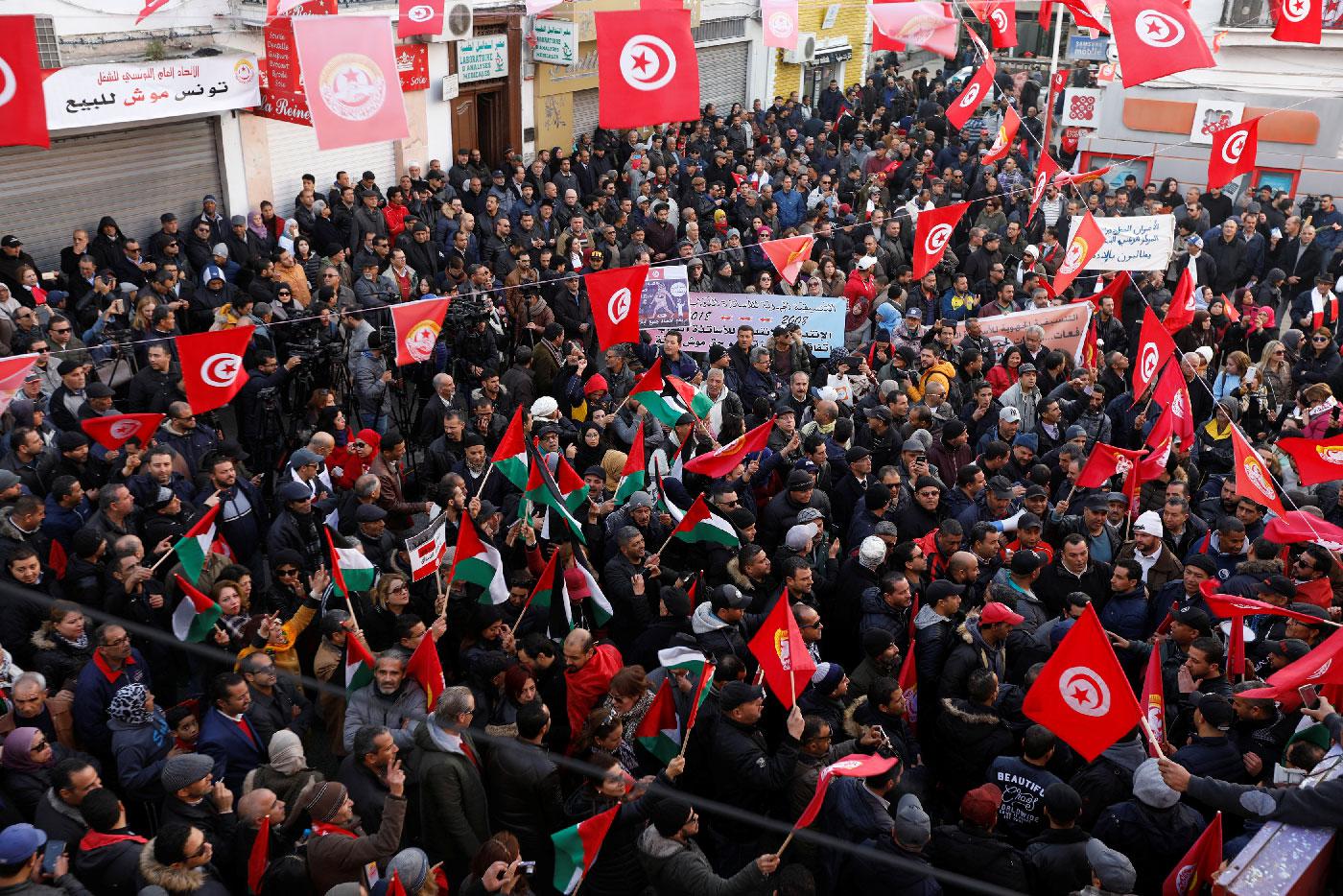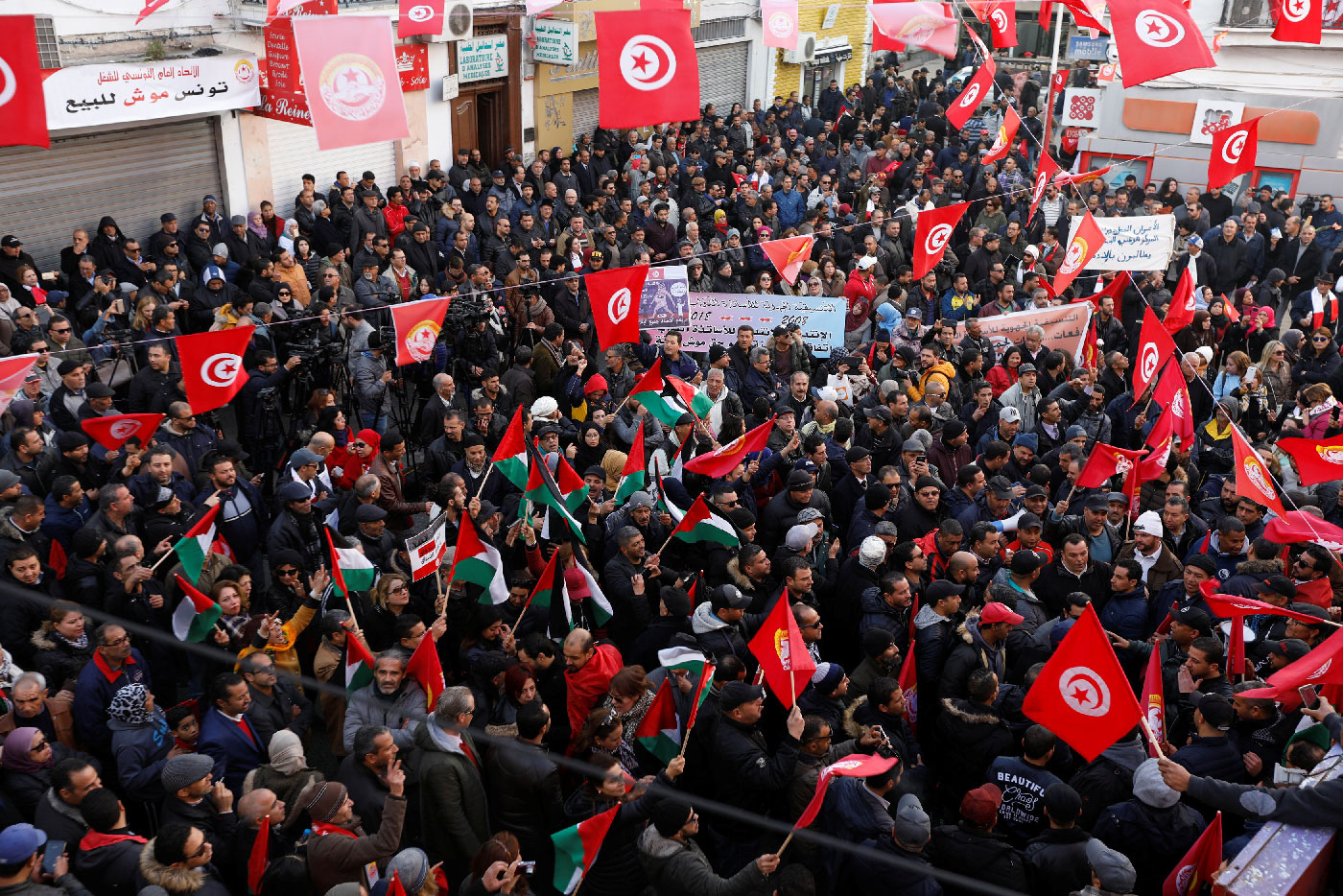Public service strike paralyses Tunisia, new walk out announced
TUNIS - A nationwide strike over pay increases paralysed activities at Tunisia’s airports, ports and train stations and closed public schools and universities but turned out to be a peaceful protest.
The effects of the 1-day strike January 17 were compounded by the Tunisian General Labour Union’s (UGTT) dismissal of the government’s request that some employees keep working to ease repercussions in public services such as airline transportation.
While Tunisian Prime Minister Youssef Chahed the day before the strike said such action was a constitutional right as part of freedom of expression, the government issued a requisition decree for thousands of employees to report to work at approximately 20 ministries and state-owned enterprises overseeing aviation, shipping, health care, garbage collection, forest surveillance and horse-feeding.
Tunisian law states that any employee who does not respond to a government requisition order can face up to one year in jail. The UGTT urged its members to ignore the order, arguing that only the president had the right to issue that order.
“The government can just soak its requisition order paper in water and drink it up,” said UGTT Secretary-General Noureddine Taboubi as the union claimed “almost 100%” of the nearly 700,000 employees of the Tunisian public sector had walked out.
Local media said the strike paralysed activities in the public sector across the country with only emergency services at hospitals maintained. The military and police were unaffected, however.
UGTT members and their supporters from leftist opposition groups crowded streets near union headquarters across the country to display the union’s muscle, which its leaders promised to exert even more clearly in elections later this year.
Even with a large number of people in the streets, “the strike went on without any troubles or any act of breach of public order,” said Interior Ministry spokesman Sofiene Zaag.
Tunisian Interior Minister Hichem Fourati sent a written message to police to “congratulate them for their professionalism in successfully managing the fallout from the strike.”
He urged them to “preserve this democratic achievement and safeguard the trust built on the security establishment as a force dedicated to serving the citizens and the nation.”
Union supporters in Tunis chanted: “Citizens you are the victims, come join the cause.”
The showdown between the trade unions and the Chahed government is far from over, however. UGTT leaders said they will “escalate” their demands for wage raises and called for a public service strike February 20-21.
The government hopes to move on. “Now as the strike is behind us, our focus is on resuming dialogue with the UGTT to reach a deal,” said Social Affairs Minister Mohamed Trabelsi, a former UGTT official.
UGTT officials had sought pay increases of as much as $90 a month for civil servants and the government countered with an offer of about a $60-a-month increase. Civil servants’ salaries, as a percentage of the country’s GDP, are among the highest in the world but inflation has eroded all Tunisians’ purchasing power.
Economists projected severe inflationary and budget deficit problems if officials granted large pay raises. Chahed has said he’s against raising taxes overall to pay for the salary increases.
“We proposed an important raise in wages but it was rejected by UGTT. The nationwide strike will be very expensive but we cannot give more than our budget capabilities,” Chahed said a few hours before the strike began.
Sources said the UGTT threatened to extend the next strike to the private sector, including areas that are key foreign currency earners such as manufacturing exports and the tourism industry.
“We will win the pay raises whether they like it or not,” Taboubi repeated defiantly at rallies.
The showdown over salary reminds Tunisia of its enduring quandary. The country’s political and social stability hinges on higher economic growth that could help cure its social woes, including massive unemployment, high inflation and wide budget and trade deficits.
Eight governments have been unable to tackle the economic crisis in which the country plunged after the toppling of President Zine el-Abidine Ben Ali in 2011.
“If the social climate deteriorates further with the country moving towards elections, no one can predict the consequences. The problem does not lie in the general strike. The issue would be the absence of dialogue and the escalation from the UGTT and the government to plunge the country into a more complex crisis,” said political analyst Zied Krichene.
“The solutions will be temporary for two years as the fundamental settlement of the problems will come from preparing the right conditions to spur the growth with high added values in manufacturing industries, services and farming,” he added.
“Tunisia will have parliamentary and presidential elections and the beginning of the solution will come from the best choices of voters,” he said.
The country is likely to muddle through its economic stagnation as it heads to elections in December amid polarisation between anti-Islamist secularists backed by UGTT, the Islamist Ennahda Movement and their allies in the fracturing secularist camp.
Ennahda, which is the main party in the government and parliament, was among the leading political groups to shy away from expressing support for the UGTT strike.
Lamine Ghanmi is a veteran Reuters journalist. He has covered North Africa for decades and is based in Tunis.
This article was originally published in The Arab Weekly.




